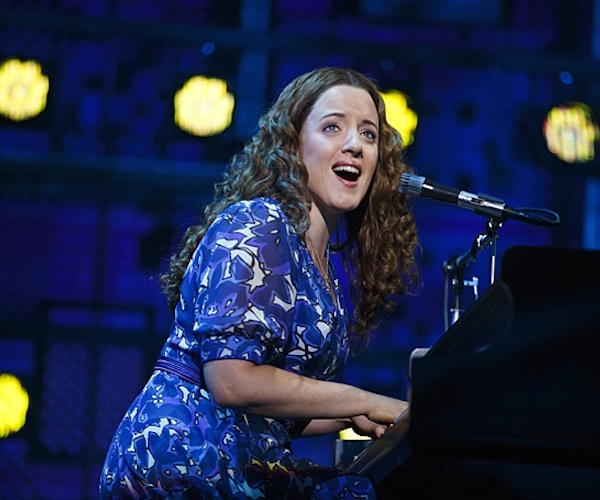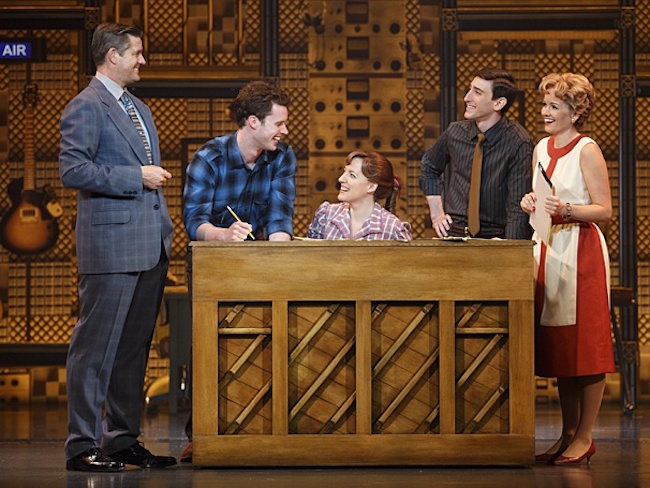Theater Review: “Beautiful”—A Joyous Musical Bio of Carole King
In this national touring production of Beautiful, the music is given everything it needs to soar: perfectly cast leads, and an ensemble of excellent singers who channel the original recording artists.
Beautiful: The Carole King Musical. Book by Douglas McGrath. Words and music by Gerry Goffin & Carole King and Barry Mann & Cynthia Weil. Director, Mark Bruni. Choreographer, Josh Prince. Music supervision and additional arrangements, Jason Howland. Costume design, Alejo Vietti. Set design, Derek McLane. Lighting design, Peter Kaczorowski. Broadway in Boston, Boston Opera House, 539 Washington Street, Boston, MA, through November 15.

Abby Mueller (Carole King) in the national tour of “Beautiful: The Carole King Musical.” Photo: Joan Marcus.
By Evelyn Rosenthal
Carole King made her name with one of popular music’s biggest-selling and most enduring albums, the 1971 megahit Tapestry. But if the generation of young people—women, especially—who wore out their copies of the LP by this “new” music star hadn’t known that King was already a huge success in the business, the writing credits for two of the album’s songs made that clear. “Will You Love Me Tomorrow” and “(You Make Me Feel Like) A Natural Woman” (recorded by the Shirelles and Aretha Franklin, respectively) had been part of the previous decade’s hit parade, along with dozens of other songs King and her lyricist husband Gerry Goffin wrote out of their office at 1650 Broadway, one of the two hubs of 1950s and ’60s pop songwriting (the other was the Brill Building, down the block at 1619). Now it was King’s turn to present her own songs, in her own voice.
Beautiful: The Carole King Musical focuses on King’s relationship with Goffin and their friendship (and friendly rivalry) with the equally successful songwriting couple Barry Mann and Cynthia Weil. Douglas McGrath’s book goes somewhat beyond the more revue-like “jukebox musical,” deftly weaving dozens of hit songs into the story of how the Brooklyn-born teenaged tunesmith became the L.A. singer-songwriter whose second solo album, Tapestry, stayed on the charts for an astonishing six years. As a former Saturday Night Live writer, coauthor of the Oscar-nominated script for Woody Allen’s Bullets Over Broadway, and writer/director of the 1997 adaptation of Jane Austen’s Emma, McGrath knows his way around comedy. Though the dialogue sometimes veers into sitcom territory—especially in the Jewish motherisms of Genie Klein (King’s mother, played, thankfully, not too broadly by Suzanne Grodner) and Mann’s over-the-top hypochondria—much of it is hilarious, understated, and wry.
But the heart of Beautiful is, of course, the music. Just as the show’s songs reflect the lives of its main characters, the memorable pop music they wrote is deeply ingrained in the lives of those who grew up listening to it. Anyone who tuned in to Top 40 radio between the late 1950s and early ’70s will recognize—and probably know every word to—songs like Goffin/King’s “Up on the Roof” and her “You’ve Got a Friend,” and Mann/Weil’s “Walking in the Rain,” “We Gotta Get Out of This Place,” and their great Righteous Brothers hit, “You’ve Lost That Lovin’ Feeling.” In this national touring production, the music is given everything it needs to soar: perfectly cast leads, and an ensemble of excellent singers who channel the original recording artists, wearing fabulous silk suits (the Drifters) and hot pink and aqua sequined and fringed dresses (the “girl groups”), doing their elaborately choreographed steps to exciting arrangements played by a crack band, on stages within the stage, framed by dazzling marquee lights.
King is played by Abby Mueller, a wonderfully talented actor and singer (and yes, the sister of Jessie Mueller, who won a Tony as the show’s original Carole King and recently starred here in the A.R.T.’s Waitress). Mueller brings to the role a great deal of down-to-earth charm, a decent Brooklyn accent, and a terrific voice that suggests but doesn’t mimic King’s. She evokes both the young composer’s confidence in her talent—fast-talking her way into an audition at age 16 with music publisher Don Kirshner (Curt Bouril), her eventual boss—and her insecurity about her looks, worrying if she can attract the good-looking Gerry, an aspiring playwright she meets at Queens College. Liam Tobin convincingly portrays Goffin’s edginess, his lust for success (and other women) mixed with doubts about the worth of his profession and the suburban married life it gave him. Tobin gives the satiric “Pleasant Valley Sunday”—written for the eponymous stars of the TV sitcom The Monkees—more bite than the original recording, and its lyrics convey Goffin’s ambivalence about the couple’s move to New Jersey, which, along with his drug use (downplayed in the script) and mental instability, led to the breakup of their marriage and their musical partnership.

Curt Bouril (Don Kirshner), Liam Tobin (Gerry Goffin), Abby Mueller (Carole King), Ben Fankhauser (Barry Mann) & Becky Gulsvig (Cynthia Weil) in the national tour of “Beautiful: The Carole King Musical.” Photo: Joan Marcus.
Mann and Weil provide the traditional “best-friend” couple comic relief (see everything from The Bandwagon to When Harry Met Sally). Ben Fankhauser makes the neurotic, romantic Barry quite likable, and you root for him to convince Cynthia to make their partnership permanent by marrying him. And Becky Gulsvig shines as the elegantly dressed, self-possessed Cynthia, who takes Don Kirshner’s office—and the stage—by storm with a sample of her own witty lyrics set to the tune of “Happy Days Are Here Again.”
More than simply comic relief, though, the characters and songs of Mann and Weil add to King’s story by helping to flesh out a portrait of the ferment of creativity and commerce that generated so much of the era’s popular music. In addition to recreations of the polished recorded versions, we hear the writers pitching their songs in, for instance, Carole’s rendition of “It Might as Well Rain Until September” for Kirshner, complete with instructions like “there should be strings here, like raindrops falling.” Instead of the Ronettes’ version of “Walking in the Rain” we get Fankhauser and Gulsvig’s stripped-down piano-voice duet of the Mann and Weil song that reveals a sweetness hidden behind the Phil Spector’s “wall of sound.” And there’s a thrilling segue from Fankhauser’s high tenor intro to “You’ve Lost That Lovin’ Feeling” to a new key, and the deep baritone entrance of Andrew Brewer as Bill Medley.
Toward the show’s end we’re given a foretaste of King’s solo career as she sits in with a band at the Bitter End and plays a new song written without Goffin, “It’s Too Late.” She decides to move to California (which she did in 1968), with Kirshner’s blessing and an introduction to Tapestry producer Lou Adler, and the ending fast forwards to her 1971 Carnegie Hall debut. We never get more than a sketchy look at what it took for King to reinvent herself as a 1970s singer-songwriter, in the company of the likes of Joni Mitchell and James Taylor. What comes through clearly in Beautiful, though, is the joy Carole King and the other writers took in putting together the indelible words and beats and melodies that bubbled up out of those back-to-back cubicles and offices on Broadway and made their way through radio and phonograph, into our hearts. You may be able to sit through this musical without feeling the urge to sing along, but I wouldn’t bet on it.
Evelyn Rosenthal is the former editor in chief and head of publications at the Harvard Art Museums. She is also a professional singer, specializing in jazz and Brazilian music. She writes about musical theater, books, and music for The Arts Fuse.
Tagged: Barry Mann, Beautiful: The Carole King Musical, Broadway in Boston, Carole King, Cynthia Weil

[…] Beautiful: The Carole King Musical, an example of the “Bio Musical,” was reviewed in The Arts Fuse when it toured three years ago. Critic Evelyn Rosenthal noted that the book was paltry: “We never get more than a sketchy look at what it took for King to reinvent herself as a 1970s singer-songwriter, in the company of the likes of Joni Mitchell and James Taylor.” Yet, even with an anemic script, producers have booked the show to return to Boston in 2019. And waiting in the wings is another jukebox musical, The Simon and Garfunkel Story, set to open in Lowell on November 18. […]